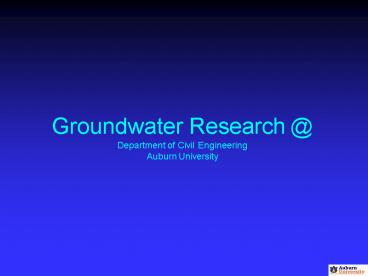Overview of GMS PowerPoint PPT Presentation
1 / 36
Title: Overview of GMS
1
Groundwater Research _at_ Department of Civil
Engineering Auburn University
2
EWR Faculty Members
- Dr. Mark Barnett (Geochemistry)
- Dr. Don Zhang (Chemical treatment processes)
- Dr. Cliff Lange (Microcosm and soil microbiology)
- Dr. Willie Harper (Microbiology of wastewater)
- Dr. Prabhakar Clement (Groundwater)
- Dr. Joel Melville (Hydraulics)
- Dr. Melek Kazezyilmaz-Alhan (Hydrology)
3
Understanding microbiology and chemistry of GW
systems
4
Brooklawn Superfund site
5
(No Transcript)
6
Microcosm work
7
Biodegradation of mixed organics- PCE, TeCA, TCE
and TCA
8
Nano-particle researchDr. Don Zhao
9
Dechlorination using ZVI (nano-particles)
- Reduction of TCE
- Advantages
- High reactivity and fast kinetics
- No toxic intermediates
10
Modifications of Fe(0) particles
- Coat iron with a metal catalyst such as Pd, Ni,
Cu - Reduce the particle size to nanoscale
Fe0 Pd2? Fe2 Pd0
4Fe3 3BH4- 9H2O? 4Fe0 3H2BO3- 12 H 6H2
11
Preparation of Starch Stabilized Fe(0)
Nanoparticles
Add electron donor, BH4- and an IX resin
Add Fe3 or Fe2 (0.051 g/L as Fe)
Step 3. Formation of Fe(0) clusters coated with
stabilizers
Step 1. Solution with 01 (w/w) of a stabilizer.
Step 2. Fe3 or Fe2 complexes with stabilizer
Add a Secondary metal, Pd (0.1 of Fe)
Step 4. Formation of stabilized Fe-Pd bimetallic
nanoparticles.
12
The Dispersibility of Nanoparticles in Soil
Non-stabilized Stabilized
13
Dechlorination of TCE Using Various Fe-Pd
Nanoparticles
C0 50mg/L Fe 0.1g/L Starch or NaCMC 0.2
(w/w) PdFe 0.1/100
14
Feasibility of reducing source zone flux by
injecting nano-particles
15
TCE Flux Experiment with 1 ml 4 ml/min flow
16
TCE Flux Experiments 1 ml TCE flush with 4
ml/min, 8 ml/min, 4 ml/min
17
(No Transcript)
18
Geochemistry of metalsDr. Mark Barnett
19
Remediation of Metals and Radionuclides
- Unlike organic contaminants, metals and
radionuclides cannot be degraded
- However, metals and radionuclides undergo a
variety of biotic and abiotic transformations
- Adsorption/ion exchange
- Precipitation/dissolution
- Oxidation/reduction
- Complexation
- Understanding these transformations crucial to
successful site cleanup
20
Determine the form of Hg in the Soil
- Using a combination of modeling, leaching tests,
and x-ray/electron beams methods, determined that
the Hg in the soils was predominantly HgS(s), a
relatively insoluble, non-bioavailable Hg form
21
Projects related to Metals
- Arsenic reactions with Mn02
- Uranium reactions with iron-coated sands
- Development of a geochemical package for RT3D
coupled to surface-complexation sorption models - Fate and transport of Hg in environmental systems
- Treatment methods for arsenic contamination
- Bioavailability of heavy metals
22
Understanding contaminant transport
characteristics near salt wedge
23
Experimental Setup
24
Tank Details
- Dimensions of the flow tank
- 53 x 28 x 2.5 (cm)
- Saltwater density
- 1.04 g/ml
- Porous media Glass beads
- d50 1.1 (mm)
- Porosity 0.40
- K (hydraulic conductivity) 1200 m/day
- Stainless steel screen to minimize entry/exit
losses
25
Experiment Details
- Salt solution is made with water, NaCl and red
dye (tracer) - Density is measured periodically with a
hydrometer to ensure consistency - Constant head chambers were employed on both
freshwater and saltwater sides to maintain steady
head
26
Sample Experimental Data A1 FW Head 29.3
cm SW Head 28.3 cmDensity of Saltwater 1.04
g/mL
?h 1 cm
27
Steady State Data Set for Saltwater Density of
1.04 g/mL
?h 0.8 cm
?h 1 cm
?h 1.2 cm
?h 1.5 cm
28
Contamination of coastal zones
29
Saltwater intrusion
30
Field sampling near a wedge.
Looking for problems!
High tech drilling!
31
Field sampling (Salt conc.)
Figure from Sean Westbrook, MS work completed at
University of Western Australia CSIRO Perth
32
Field sampling (Benzene conc.)
Figure from Sean Westbrook, MS work completed at
University of Western Australia CSIRO Perth
33
Transport near a salt wedge (lab)
34
Transport near a salt wedge
35
Transport near a salt wedge
36
Analytical solution to reactive transport (USEPA
tool BIOCHLOR/ ART3D)

